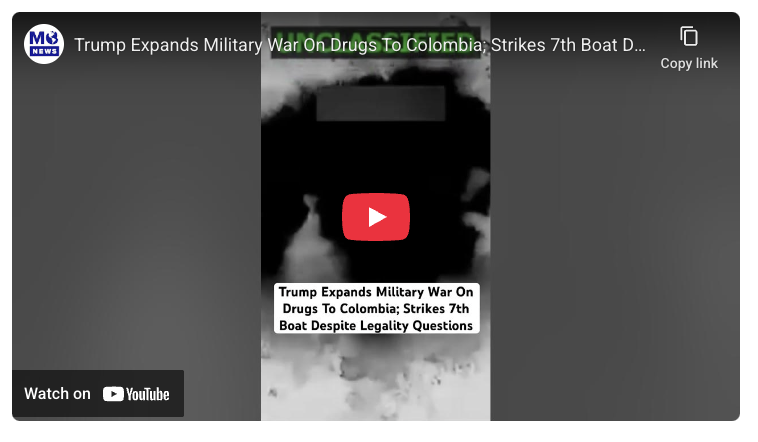Trump Expands Military War on Drugs to Colombia; Attacks 7th Boat Despite Legality Questions
The Trump administration is widening its military and political campaign in Latin America — targeting not only Venezuela but now Colombia, formerly a close U.S. ally in the region.
The U.S. military carried out its seventh strike Friday on an alleged drug-carrying vessel in the Caribbean since September, killing three people on board, Defense Secretary Pete Hegseth announced Sunday.
“The United States military will treat these organizations like the terrorists they are— they will be hunted, and killed, just like Al Qaeda,” Hegseth wrote on X.
He linked the vessel to Colombia’s National Liberation Army, or ELN, a designated terrorist organization long accused of funding itself through narcotics.
The Trump administration said previous strikes were targeting Venezuelan networks. The expanding military “war on drugs” has a bipartisan group of lawmakers looking at potentially
TRUMP TAKES AIM AT COLOMBIA
Over the weekend, President Trump announced the U.S. would cut off all aid to Colombia, calling far leftist President Gustavo Petro an “illegal drug leader.“
“They make drugs, they refine drugs, they make cocaine, they have cocaine factories,” Trump said. “They have no fight against drugs, and I’m stopping all payments to Colombia because they don’t have anything to do with their fight against drugs.”
Petro’s response: The day before, the Colombian president condemned the U.S. strike, accusing Washington of hitting a civilian fishing boat and invading “national territory.” Petro has recently compared Trump to Hitler. Over the weekend, Petro called himself the enemy of drug cartels — even though Colombia remains the world’s largest exporter of cocaine.
BOAT STRIKES
So far, at least 32 people have been killed in boat strikes as part of the Trump administration’s controversial campaign treating drug traffickers as terrorists.
Two people survived a strike Thursday and were sent back to their home countries of Ecuador and Colombia.
Critics say returning them without charges avoids judicial review of the administration’s actions and raises questions about who is really on these boats.
After Al Qaeda’s 9/11 attacks on the U.S., Congress authorized the use of military force against the terrorist group. Congress has not approved such action against Latin American drug cartels.
Rep. Adam Smith, the top Democrat on the House Armed Services Committee, called Monday for a hearing on the Trump administration’s use of military force to kill suspected drug smugglers, rather than arrest them as criminals with due process rights.
Sen. Rand Paul (R-KY) said Sunday the strikes “go against all of our tradition.” He continued, “When you kill someone, you should know, if you’re not at war, not in a declared war, you really need to know someone’s name at least.”
On the other side, Sen. Lindsey Graham (R-SC), said the strikes are about protecting Americans from drugs.
“Every boat kills 25,000 (Americans) on average” from drug overdoses, Trump has repeatedly said. “You can see it, the boats get hit, and you see that fentanyl all over the ocean.”
However, the Washington Post reports that U.S. and international officials say fentanyl headed for the U.S. is not typically transported via these routes. Fentanyl seized in the U.S. is typically made in Mexico using precursors from China and brought in through land borders.
BIGGER PICTURE
The other fear from some in Congress is that the line between anti-drug enforcement and regime change is blurring — especially when it comes to attacks on Venezuelans. The previous six vessel attacks since September were allegedly against Venezuelan drug cartels.
In recent months, the U.S. military has built its largest presence in the Caribbean in decades — a show of force that echoes the 1989 raid that ousted Panamanian dictator Manuel Noriega.
Noriega had once worked with the CIA, but later turned on the U.S. and became deeply involved in the drug trade.
The situation in Venezuela today has some of the same ingredients: an unpopular, authoritarian leader accused of ties to narcotics and facing rising U.S. pressure.
At stake in Venezuela are vast strategic resources: the world’s largest oil reserves, plus significant deposits of gold, diamonds and coltan. It has fallen from being South America’s richest nation to one of its poorest over the last two decades. Millions of Venezuelans have left the country in recent years—many seeking asylum in the U.S.

